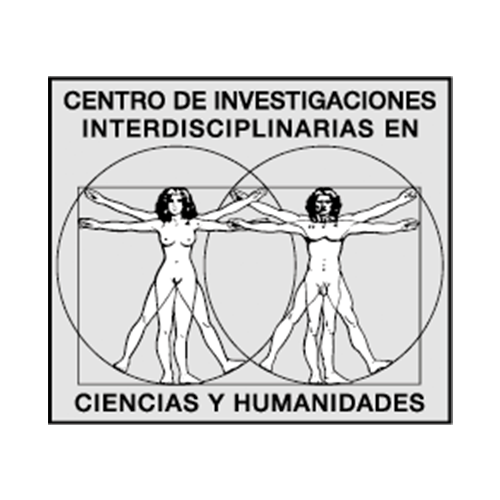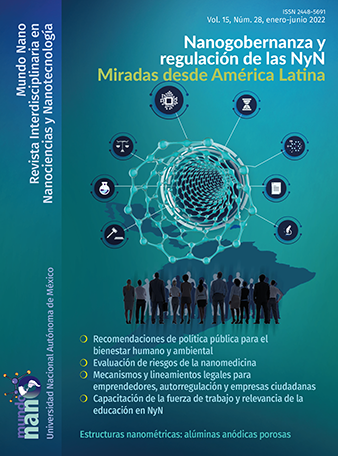Gobernanza de la nanomedicina: una revisión sistemática
Contenido principal del artículo
Resumen
La nanomedicina (la aplicación de la nanotecnología en medicina) está revolucionando el diagnóstico, tratamiento y control de enfermedades. Aunque es cierto que esta ha generado importantes beneficios desde el punto de vista médico, existen riesgos toxicológicos, ambientales, éticos y sociales que deben ser analizados. La gobernanza, entre otras cosas, abarca la gestión de riesgos y beneficios de las nuevas tecnologías, por lo que puede aplicarse en nanomedicina para el análisis de riesgos. El objetivo de este artículo es mostrar un panorama de la gobernanza de la nanomedicina a través de una revisión sistemática de la literatura científica. La metodología empleada consistió en los siguientes pasos: 1) búsqueda de artículos en las bases de datos de Scopus, Web of Science y SciELO; 2) limpieza de resultados; 3) obtención de datos altmétricos de la plataforma Dimensions; 4) descarga y lectura de los artículos, y, 5) análisis crítico de los artículos. Como resultado se identificaron deficiencias regulatorias y preocupaciones éticas vinculadas con los productos nanomédicos, pero también se encontraron propuestas para evaluar riesgos y abordar aspectos éticos. Se concluye que, aunque ha habido progresos en la evaluación de riesgos, aún existen asuntos pendientes en materia de regulación.
Descargas
Detalles del artículo

Mundo Nano. Revista Interdisciplinaria en Nanociencias y Nanotecnología, editada por la Universidad Nacional Autónoma de México, se distribuye bajo una Licencia Creative Commons Atribución-NoComercial 4.0 Internacional.
Basada en una obra en http://www.mundonano.unam.mx.
Citas
Altenstetter, Christa. (2011). Medical device regulation and nanotechnologies: determining the role of patient safety concerns in policymaking. Law & Policy, 33 (2): 227-55. https://doi.org/10.1111/j.1467-9930.2010.00337.x DOI: https://doi.org/10.1111/j.1467-9930.2010.00337.x
Álvarez-Díaz, Jorge Alberto. (2011). Retos de la bioética en la medicina del siglo XXI. Revista Peruana de Medicina Experimental y Salud Publica, 28 (4): 657-63. DOI: https://doi.org/10.17843/rpmesp.2011.284.431
Anand, Manish, Nidhi Srivastava y Shilpanjali Sarma. (2011). Policy and ethical concerns in nanotechnology safety: case of Indian Health Sector. Journal of Biomedical Nanotechnology, 7 (1): 34-35. https://doi.org/10.1166/jbn.2011.1188 DOI: https://doi.org/10.1166/jbn.2011.1188
Andorno, Roberto y Nikola Biller-Andorno. (2014). The risks of nanomedicine and the precautionary principle. En Bert Gordijn y Anthony Mark Cutter (eds.), In pursuit of nanoethics, 131-45. The International Library of Ethics, Law and Technology. Dordrecht: Springer Netherlands. https://doi.org/10.1007/978-1-4020-6817-1_9 DOI: https://doi.org/10.1007/978-1-4020-6817-1_9
Anzaldo, Mónica, Michelle Chauvet y Luis A. Maldonado. (2014). Fondos públicos para la investigación en nanotecnologías en México y el cambio de paradigma de la política de CTI. Interciencia, 39 (1): 8-15.
Basova, Tamara V., Evgeniia S. Vikulova, Svetlana I. Dorovskikh, Aseel Hassan y Natalya B. Morozova. (2021). The use of noble metal coatings and nanoparticles for the modification of medical implant materials. Materials & Design, 204 (junio): 109672. https://doi.org/10.1016/j.matdes.2021.109672 DOI: https://doi.org/10.1016/j.matdes.2021.109672
Bawa, Raj. (2016). FDA and nano: baby steps, regulatory uncertainty and the bumpy road ahead. En Handbook of Clinical Nanomedicine: Law, Business, Regulation, Safety, and Risk, 1502. Nueva York: Taylor & Francis. https://doi.org/10.1201/b19910
Bawa, Raj y Summer Johnson. (2009). Emerging issues in nanomedicine and ethics. En Fritz Allhoff y Patrick Lin (eds.), Nanotechnology & society: Current and emerging ethical issues, 207-23. Dordrecht: Springer Netherlands. https://doi.org/10.1007/978-1-4020-6209-4_11
Bawa, Raj y Summer Johnson. (2020). Overview of ethical issues in nanomedicine. En Mousa, Bawa and Audette (eds.), The road from nanomedicine to precision. https://doi.org/10.1201/9780429295010 DOI: https://doi.org/10.1201/9781003027058-15
Berger, Mauricio y Airton Guilherme Berger Filho. (2022). Nano-governance, nano-regulación y, ¿nano-ciudadanía? Mundo Nano. Revista Interdisciplinaria en Nanociencias y Nanotecnología, 15 (28): 1e-26e. https://doi.org/10.22201/ceiich.24485691e.2022.28.69659 DOI: https://doi.org/10.22201/ceiich.24485691e.2022.28.69659
Bhatia, Pooja y Archana Chugh. (2017). A multilevel governance framework for regulation of nanomedicine in India. Nanotechnology Reviews, 6 (4): 373-82. https://doi.org/10.1515/ntrev-2016-0083 DOI: https://doi.org/10.1515/ntrev-2016-0083
Cancino, Juliana, Valéria S. Marangoni y Valtencir Zucolotto. (2014). Nanotecnologia em medicina: aspectos fundamentais e principais preocupações. Química Nova, 37 (junio): 521-26. https://doi.org/10.5935/0100-4042.20140086 DOI: https://doi.org/10.5935/0100-4042.20140086
Caracciolo, Giulio. (2015). Liposome–protein corona in a physiological environment: challenges and opportunities for targeted delivery of nanomedicines. Nanomedicine: Nanotechnology, Biology and Medicine, 11 (3): 543-57. https://doi.org/10.1016/j.nano.2014.11.003 DOI: https://doi.org/10.1016/j.nano.2014.11.003
Chen, X. y H. J. Schluesener. (2008). Nanosilver: a nanoproduct in medical application. Toxicology Letters, 176 (1): 1-12. https://doi.org/10.1016/j.toxlet.2007.10.004 DOI: https://doi.org/10.1016/j.toxlet.2007.10.004
Chowdhury, Nupur. (2010). Regulation of nanomedicines in the EU: distilling lessons from the pediatric and the advanced therapy medicinal products approaches. Nanomedicine, 5 (1): 135-42. https://doi.org/10.2217/nnm.09.91 DOI: https://doi.org/10.2217/nnm.09.91
Cózar Escalante, José Manuel de. (2012). Dimensiones de la investigación social sobre la nanobiotecnología. Revista Iberoamericana de Ciencia, Tecnología y Sociedad – CTS, 7 (20): 1-17.
Crommelin, Daan J. A., Peter van Hoogevest y Gert Storm. (2020). The role of liposomes in clinical nanomedicine development. What now? Now what? Journal of Controlled Release, 318 (febrero): 256-63. https://doi.org/10.1016/j.jconrel.2019.12.023 DOI: https://doi.org/10.1016/j.jconrel.2019.12.023
De Ville, Kenneth A. (2008). Law, regulation and the medical use of nanotechnology. En Fabrice Jotterand (ed.), Emerging conceptual, ethical and policy issues in bionanotechnology, 181-200. Philosophy and Medicine. Dordrecht: Springer Netherlands. https://doi.org/10.1007/978-1-4020-8649-6_11 DOI: https://doi.org/10.1007/978-1-4020-8649-6_11
Delgado Ramos, Gian Carlo y Luis Alberto Hernández Burciaga. (2013). Avances e implicaciones éticosociales de la nanomedicina: una revisión desde el caso del cáncer cerebral. Mundo Nano. Revista Interdisciplinaria en Nanociencias y Nanotecnología, 6 (10): 63-85. https://doi.org/10.22201/ceiich.24485691e.2013.10.50965 DOI: https://doi.org/10.22201/ceiich.24485691e.2013.10.50965
Dorbeck-Jung, Brbel R. y Nupur Chowdhury. (2011). Is the European medical products authorisation regulation equipped to cope with the challenges of nanomedicines? SSRN Scholarly Paper ID 1782436. Rochester, NY: Social Science Research Network. https://doi.org/10.1111/j.1467-9930.2011.00339.x DOI: https://doi.org/10.1111/j.1467-9930.2011.00339.x
Duncan, Ruth y Rogerio Gaspar. (2011). Nanomedicine(s) under the microscope. Molecular Pharmaceutics, 8 (6): 2101-41. https://doi.org/10.1021/mp200394t DOI: https://doi.org/10.1021/mp200394t
D’Silva, Joel, Douglas K. R. Robinson y Clare Shelley-Egan. (2012). A game with rules in the making – how the high probability of waiting games in nanomedicine is being mitigated through distributed regulation and responsible innovation. Technology Analysis & Strategic Management, 24 (6): 583-602. https://doi.org/10.1080/09537325.2012.693671 DOI: https://doi.org/10.1080/09537325.2012.693671
EGE. (2007). Opinion on the ethical aspects of nanomedicine – Opinion N° 21. https://op.europa.eu/en/publication-detail/-/publication/4d7d9c99-2129-42e1-993e-c815b91f256b/language-en/format-PDF/source-77404425#
EU NanoSafety Cluster. (S. f.). NanoSafety Cluster. (Consultado, 4 de agosto de 2021). https://www.nanosafetycluster.eu/
Evans, Robert, Michael McNamee y Owen Guy. (2017). Ethics, nanobiosensors and elite sport: the need for a new governance framework. Science and Engineering Ethics, 23 (6): 1487-1505. https://doi.org/10.1007/s11948-016-9855-1 DOI: https://doi.org/10.1007/s11948-016-9855-1
FDA. (2020). Nanotechnology–Over a decade of progress and innovation. https://www.fda.gov/media/140395/download
Foladori, Guillermo. (2009). La gobernanza de las nanotecnologías. Sociológica (México), 24 (71): 125-53.
Funari, Riccardo, Kang-Yu Chu y Amy Q. Shen. (2020). Detection of antibodies against SARS-CoV-2 spike protein by gold nanospikes in an opto-microfluidic chip. Biosensors and Bioelectronics, 169 (diciembre): 112578. https://doi.org/10.1016/j.bios.2020.112578 DOI: https://doi.org/10.1016/j.bios.2020.112578
Gadekar, Vedant, Yogeshwari Borade, Suraj Kannaujia, Kuldeep Rajpoot, Neelima Anup, Vishakha Tambe, Kiran Kalia y Rakesh K. Tekade. (2021). Nanomedicines accessible in the market for clinical interventions. Journal of Controlled Release, 330 (febrero): 372-97. https://doi.org/10.1016/j.jconrel.2020.12.034 DOI: https://doi.org/10.1016/j.jconrel.2020.12.034
Ganau, Mario, Lara Prisco, Nikolaos Syrmos y Laura Ganau. (2016). Principles of nanoethics: theoretical models and clinical practice. En Handbook of Clinical Nanomedicine: Law, Business, Regulation, Safety, and Risk. Nueva York: Taylor & Francis. https://doi.org/10.1201/b19910
Giroto Carelli Hermes, Elisangela y Paulo Roberto Haidamus de Oliveira Basto. (2014). Nanotecnologia: progresso científico, material, global e ético. Persona y Bioética, 18 (2): 107-18. DOI: https://doi.org/10.5294/pebi.2014.18.2.2
Gispert, Ignasi. (2012). Overview of nanomedicines regulation in the European Union. En Jesús M. de la Fuente y V. Grazu (eds.), Frontiers of nanoscience, 4:487-507. Nanobiotechnology. Elsevier. https://doi.org/10.1016/B978-0-12-415769-9.00016-9 DOI: https://doi.org/10.1016/B978-0-12-415769-9.00016-9
Graur, F., R. Elisei, A. Szasz, H. C. Neagos, A. Muresan, L. Furcea, I. Neagoe, C. Braicu, G. Katona y M. Diudea. (2011). Ethical issues in nanomedicine. En Simona Vlad y Radu V. Ciupa (eds.), International Conference on Advancements of Medicine and Health Care through Technology, 9-12. IFMBE Proceedings. Berlín: Heidelberg: Springer. https://doi.org/10.1007/978-3-642-22586-4_3 DOI: https://doi.org/10.1007/978-3-642-22586-4_3
Haker, Hille. (2013). Nanomedicine and European Ethics – Part One. En Ethics for Graduate Researchers, 87-99. Oxford: Elsevier. https://doi.org/10.1016/B978-0-12-416049-1.00006-4 DOI: https://doi.org/10.1016/B978-0-12-416049-1.00006-4
Halappanavar, Sabina, Ulla Vogel, Hakan Wallin y Carole L. Yauk. (2018). Promise and peril in nanomedicine: the challenges and needs for integrated systems biology approaches to define health risk. WIREs Nanomedicine and Nanobiotechnology, 10 (1): e1465. https://doi.org/10.1002/wnan.1465 DOI: https://doi.org/10.1002/wnan.1465
Hogle, Linda F. (2012). Concepts of risk in nanomedicine research. The Journal of Law, Medicine & Ethics, 40 (4): 809-22. https://doi.org/10.1111/j.1748-720X.2012.00709.x DOI: https://doi.org/10.1111/j.1748-720X.2012.00709.x
Invernizzi, Noela, Guillermo Foladori, Eduardo Robles-Belmont, Edgar Záyago Lau, Edgar Arteaga Figueroa, Carolina Bagattolli, Tomás Javier Carrozza, Adriana Chiancone y William Urquijo. (2015). Nanotechnology for social needs: contributions from latin american research in the areas of health, energy and water. Journal of Nanoparticle Research, 17 (5): 233. https://doi.org/10.1007/s11051-015-3037-y DOI: https://doi.org/10.1007/s11051-015-3037-y
Jain, Kewal K. (2017). Introduction. En Kewal K. Jain (ed.), The Handbook of Nanomedicine, 1-9. Nueva York, NY: Springer. https://doi.org/10.1007/978-1-4939-6966-1_1
Khare, Vaibhav, Ajit K. Saxena y Prem N. Gupta. (2015). Chapter 15 – Toxicology considerations in nanomedicine. En Sabu Thomas, Yves Grohens, y Neethu Ninan (eds.), Nanotechnology applications for tissue engineering, 239-61. Oxford: William Andrew Publishing. https://doi.org/10.1016/B978-0-323-32889-0.00015-7 DOI: https://doi.org/10.1016/B978-0-323-32889-0.00015-7
Khushf, George. (2007). Upstream ethics in nanomedicine: a call for research. Nanomedicine, 2 (4): 511-21. https://doi.org/10.2217/17435889.2.4.511 DOI: https://doi.org/10.2217/17435889.2.4.511
Kim, Jiyoung, Young-um Jo y Kun Na. (2020). Photodynamic therapy with smart nanomedicine. Archives of Pharmacal Research, 43 (1): 22-31. https://doi.org/10.1007/s12272-020-01214-5 DOI: https://doi.org/10.1007/s12272-020-01214-5
Kimmelman, Jonathan. (2012). Beyond human subjects: risk, ethics, and clinical development of nanomedicines. The Journal of Law, Medicine & Ethics, 40 (4): 841-47. https://doi.org/10.1111/j.1748-720X.2012.00712.x DOI: https://doi.org/10.1111/j.1748-720X.2012.00712.x
Lemine, O. M. (2019). Chapter 7 – Magnetic hyperthermia therapy using hybrid magnetic nanostructures. En Raghvendra Ashok Bohara y Nanasaheb Thorat (eds.), Hybrid nanostructures for cancer theranostics, 125-38. Micro and Nano Technologies. Elsevier. https://doi.org/10.1016/B978-0-12-813906-6.00007-X DOI: https://doi.org/10.1016/B978-0-12-813906-6.00007-X
Li, Xue, Xue-Ning Zhang, Xiao-Dong Li y Jin Chang. (2016). Multimodality imaging in nanomedicine and nanotheranostics. Cancer Biology & Medicine, 13 (3): 339-48. https://doi.org/10.20892/j.issn.2095-3941.2016.0055 DOI: https://doi.org/10.20892/j.issn.2095-3941.2016.0055
Lima-Dora, Cristiana, Fabian Teixeira-Primo y Gabriela de-Moraes-Soares-Araújo. (2019). Reflexões bioéticas acerca da inovação em nanomedicamentos. Revista de Bioética y Derecho, 45: 197-212.
López Goerne, Tessy María y Antonio Paoli Bolio. (2009). Ética para nanomedicina: primera propuesta para la elaboración de un código. Mundo Nano. Revista Interdisciplinaria en Nanociencias y Nanotecnología, 2 (2). https://doi.org/10.22201/ceiich.24485691e.2009.2.53585
Mahapatra, Indrani, Julian R. A. Clark, Peter J. Dobson, Richard Owen, Iseult Lynch y Jamie R. Lead. (2018). Expert perspectives on potential environmental risks from nanomedicines and adequacy of the current guideline on environmental risk assessment. Environmental Science: Nano, 5 (8): 1873-89. https://doi.org/10.1039/C8EN00053K DOI: https://doi.org/10.1039/C8EN00053K
Marchant, Gary E., Douglas J. Sylvester, Kenneth W. Abbott y Tara Lynn Danforth. (2010). International harmonization of regulation of nanomedicine. Studies in Ethics, Law, and Technology, 3 (3). https://doi.org/10.2202/1941-6008.1120 DOI: https://doi.org/10.2202/1941-6008.1120
Meel, Roy van der, Einar Sulheim, Yang Shi, Fabian Kiessling, Willem J. M. Mulder y Twan Lammers. (2019). Smart cancer nanomedicine. Nature Nanotechnology, 14 (11): 1007-17. https://doi.org/10.1038/s41565-019-0567-y DOI: https://doi.org/10.1038/s41565-019-0567-y
Nerlich, Brigitte, David D. Clarke y Fiona Ulph. (2007). Risks and benefits of nanotechnology: How young adults perceive possible advances in nanomedicine compared with conventional treatments. Health, Risk & Society, 9 (2): 159-71. https://doi.org/10.1080/13698570701306856 DOI: https://doi.org/10.1080/13698570701306856
NNI. (S. f.). What it is and how it works | National Nanotechnology Initiative. (Consultado: 9 de mayo de 2021). https://www.nano.gov/nanotech-101/what
Ocampo, José Antonio. (2015). La gobernanza económica y social en el sistema de las Naciones Unidas. En Gobernanza global y desarrollo: Nuevos desafíos y prioridades de la cooperación internacional. Buenos Aires: Siglo Veintiuno.
OCDE (Organización para la Cooperación y el Desarrollo Económicos). (S. f.). Technology governance. Technology governance. (Consultado: 23 de mayo de 2021). https://www.oecd.org/sti/science-technology-innovation-outlook/technology-governance/
OCDE y Allianz. (S. f.). Opportunities and risks of nanotechnologies. https://www.oecd.org/science/nanosafety/44108334.pdf
Pierre, Jon y B. Guy Peters. (2000). Governance, politics, and the State. Nueva York: St. Martin’s Press.
Qiu, Guangyu, Zhibo Gai, Yile Tao, Jean Schmitt, Gerd A. Kullak-Ublick y Jing Wang. (2020). Dual-functional plasmonic photothermal biosensors for highly accurate severe acute respiratory syndrome coronavirus 2 detection. ACS Nano, 14 (5): 5268-77. https://doi.org/10.1021/acsnano.0c02439 DOI: https://doi.org/10.1021/acsnano.0c02439
Rahim, Mia M. (2019). Nanomedicine regulation in Australia. Alternative Law Journal, 44 (2): 133-37. https://doi.org/10.1177/1037969X18815737 DOI: https://doi.org/10.1177/1037969X18815737
Rana, Vikas y Radhika Sharma. (2019). Chapter 5 – Recent advances in development of nano drug delivery. En Shyam S. Mohapatra, Shivendu Ranjan, Nandita Dasgupta, Raghvendra Kumar Mishra y Sabu Thomas (eds.), Applications of targeted nano drugs and delivery systems, 93-131. Micro and Nano Technologies. Elsevier. https://doi.org/10.1016/B978-0-12-814029-1.00005-3 DOI: https://doi.org/10.1016/B978-0-12-814029-1.00005-3
Reilly, Raymond M. (2007). Carbon nanotubes: potential benefits and risks of nanotechnology in nuclear medicine. Journal of Nuclear Medicine, 48 (7): 1039-42. https://doi.org/10.2967/jnumed.107.041723 DOI: https://doi.org/10.2967/jnumed.107.041723
Renn, O. y M. C. Roco. (2006). Nanotechnology and the need for risk governance. Journal of Nanoparticle Research, 8 (2): 153-91. https://doi.org/10.1007/s11051-006-9092-7 DOI: https://doi.org/10.1007/s11051-006-9092-7
Resnik, David B. y Sally S Tinkle. (2007). Ethics in nanomedicine. Nanomedicine, 2(3): 345-50. https://doi.org/10.2217/17435889.2.3.345 DOI: https://doi.org/10.2217/17435889.2.3.345
Rycroft, Taylor, Benjamin Trump, Kelsey Poinsatte-Jones e Igor Linkov. (2018). Nanotoxicology and nanomedicine: making development decisions in an evolving governance environment. Journal of Nanoparticle Research, 20 (2): 52. https://doi.org/10.1007/s11051-018-4160-3 DOI: https://doi.org/10.1007/s11051-018-4160-3
Saldivar-Tanaka, Laura. (2019). Regulando la nanotecnología. Mundo Nano. Revista Interdisciplinaria en Nanociencias y Nanotecnología, 12 (22): 37-57. https://doi.org/10.22201/ceiich.24485691e.2019.22.63140 DOI: https://doi.org/10.22201/ceiich.24485691e.2019.22.63140
Sandler, Ronald. (2009). Nanomedicine and nanomedical ethics. The American Journal of Bioethics: AJOB, 9 (10): 16-17. https://doi.org/10.1080/15265160902995117 DOI: https://doi.org/10.1080/15265160902995117
Sassen, Saskia. (2010). Territorio, autoridad y derechos: De los ensamblajes medievales a los ensamblajes globales. Buenos Aires: Katz Editores. DOI: https://doi.org/10.2307/j.ctvm7bcnb
SCENIHR. (2015). Guidance on the determination of potential health effects of nanomaterials used in medical devices. Publications Office of the European Union. https://data.europa.eu/doi/10.2772/41391
Shvedova, Anna, Antonio Pietroiusti y Valerian Kagan. (2016). Nanotoxicology ten years later: lights and shadows. Toxicology and Applied Pharmacology, The First Decade of Nanotoxicology: Achievements, Disappointments and Lessons, 299 (mayo): 1-2. https://doi.org/10.1016/j.taap.2016.02.014 DOI: https://doi.org/10.1016/j.taap.2016.02.014
Smolkova, Bozena, Maria Dusinska y Alena Gabelova. (2017). Nanomedicine and epigenome. Possible health risks. Food and Chemical Toxicology, 109 (noviembre): 780-96. https://doi.org/10.1016/j.fct.2017.07.020 DOI: https://doi.org/10.1016/j.fct.2017.07.020
Sportelli, Maria Chiara, Margherita Izzi, Ekaterina A. Kukushkina, Syed Imdadul Hossain, Rosaria Anna Picca, Nicoletta Ditaranto y Nicola Cioffi. (2020). Can nanotechnology and materials science help the fight against SARS-CoV-2? Nanomaterials (Basel, Switzerland), 10 (4). https://doi.org/10.3390/nano10040802 DOI: https://doi.org/10.3390/nano10040802
Szelenyi, Istvan. (2012). Nanomedicine: evolutionary and revolutionary developments in the treatment of certain inflammatory diseases. Inflammation Research, 61 (1): 1-9. https://doi.org/10.1007/s00011-011-0393-7 DOI: https://doi.org/10.1007/s00011-011-0393-7
Tyshenko, Michael G. (2008). Medical nanotechnology using genetic material and the need for precaution in design and risk assessments. International Journal of Nanotechnology, 5 (1): 116-23. https://doi.org/10.1504/IJNT.2008.016551 DOI: https://doi.org/10.1504/IJNT.2008.016551
Vidal Correa, Laura Elena. (2016). Análisis comparativo de la regulación en nanotecnología en Estados Unidos y en la Unión Europea. Boletín mexicano de derecho comparado, 49 (147): 277-301. http://dx.doi.org/10.22201/iij.24484873e.2016.147.10646 DOI: https://doi.org/10.22201/iij.24484873e.2016.147.10646
Vivekanandan, Jayashree. (2009). Nano applications, mega challenges: the case of the health sector in India. Studies in Ethics, Law, and Technology, 3 (3). https://doi.org/10.2202/1941-6008.1117 DOI: https://doi.org/10.2202/1941-6008.1117
WHO. (2013). Nanotechnology and human health: Scientific evidence and risk governance. Report of the WHO expert meeting 10-11 December 2012, Bonn, Germany. https://apps.who.int/iris/handle/10665/108626
Wolf, Susan M. y Cortney M. Jones. (2011). Designing oversight for nanomedicine research in human subjects: systematic analysis of exceptional oversight for emerging technologies. Journal of Nanoparticle Research, 13 (4): 1449-65. https://doi.org/10.1007/s11051-011-0237-y DOI: https://doi.org/10.1007/s11051-011-0237-y
Wu, Lin-Ping, Danyang Wang y Zibiao Li. (2020). Grand challenges in nanomedicine. Materials Science and Engineering: C, 106 (enero): 110302. https://doi.org/10.1016/j.msec.2019.110302 DOI: https://doi.org/10.1016/j.msec.2019.110302
Zhang, Chenyang, Liang Yan, Xin Wang, Shuang Zhu, Chunying Chen, Zhanjun Gu y Yuliang Zhao. (2020). Progress, challenges, and future of nanomedicine. Nano Today, 35 (diciembre): 101008. https://doi.org/10.1016/j.nantod.2020.101008 DOI: https://doi.org/10.1016/j.nantod.2020.101008
Zhu, Junwen y Weishu Liu. (2020). A tale of two databases: the use of Web of Science and Scopus in academic papers. Scientometrics, 123 (1): 321-35. https://doi.org/10.1007/s11192-020-03387-8 DOI: https://doi.org/10.1007/s11192-020-03387-8





